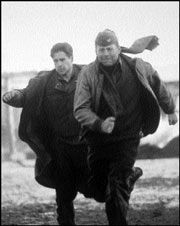HART’S WAR
directed by Gregory Hoblit with Bruce Willis, Colin Farrell, and Terrence Howard opens Feb. 15 at Metro, Oak Tree, Pacific Place, and others
THE WHITE HOUSE should’ve invited this flick for one of those presidential popcorn night premieres so beloved of Clinton. Its new resident, Dubya, represents the perfect target demographic for Hart’s War. Its titular young protagonist (Colin Farrell) is a soft Ivy League son of privilege yanked from his cushy HQ job (far from the front) and given a chance to, yes, prove himself against a nefarious foe that mocks and threatens to destroy our American way of life.
And you thought Osama was evil! Turns out these German fellows mean to kick us out of Europe; then they have the temerity to lecture us on civil liberties! So it is in the prison camp where a black aviator, Lt. Scott (Terrence Howard), is accused of murdering a white inmate. Col. McNamara (Bruce Willis) orders an unlikely P.O.W.-run trial, with law student Hart to be defense counsel, but the verdict seems predetermined—worse than Alabama, sneers the commandant of Stalag 6A.
Well—not if Tommy Hart has anything to say about it! You see, like Dubya, some men are born to be underestimated, then have greatness thrust upon them. War toughens up our hero in a hurry. He gets his first taste of combat, suffers bad frostbite, and undergoes a supposedly brutal interrogation by his captors. (Here we have the classic good Nazi/bad Nazi scene culminating with, “Would you like a cigarette? Perhaps some tea?”) By the time Hart reaches an Austrian prison camp, he’s acquired a photogenic scar on his cheekbone (Willis sports one, too) but is still treated with suspicion by his superiors.
Clearly Hart has issues with McNamara, a classic war movie hard-ass in the Patton mold, a man born into Brokaw’s Greatest Generation who stands in relation to Hart as 43 does to 41 (that’s George H. to Dubya in Bushspeak). McNamara is a stern and inscrutable father figure to Hart, who wonders why the colonel is permitting—perhaps even orchestrating—what Scott calls a lynching.
NOW WE KNOW Bruce Willis is no racist. (He hasn’t played unsympathetic characters since Mortal Thoughts and, inadvertently, Hudson Hawk.) Here, you can be pretty sure that McNamara’s ulterior motives—like those ubiquitous escape tunnels in every P.O.W. flick—will eventually be revealed.
Although short on action, thin of character, and full of leaden dialogue about “honor, duty, and sacrifice,” the familiar, ploddingly patriotic War should appeal to both Dubya and our nation’s post-Sept. 11 mood. In particular, like the raft of recent WWII movies/hagiographies, War offers a consoling, projective fantasy of heroism denied boomers who fled with their guilty consciences to Oxford, Canada, and the Texas Air National Guard. Hart is indeed “a pampered little shit” (as McNamara calls him), a weakling in need of redemption—which War grants at amazingly little cost. (Just when you think Hart might die, you remember that he introduced the picture in past-tense voice-over—so much for suspense.)
Among the troops, Willis’ McNamara manfully exemplifies War‘s didactic ideals of wartime courage and principle. Clearly the role is a cakewalk for him, yet the repressed gleam in his crinkled eyes hints at the fun he’d rather be having in a Dirty Dozen-style WWII romp. One of those cheap Irish actors washing up on our shores (just behind the tide of Aussies), Farrell manages a convincing American accent and look of stewing outrage, but no amount of acting can save lines like, “Everything in this place is a lie!” So slyly enjoyable in fluff like The Best Man, the talented Howard is burdened with the stifling dignity of his character (the movie’s Colin Powell figure).
Beneath its dutifully somber, color-blanched lessons, however, Hart’s War does harbor one memorable delinquent. As with Otto Preminger’s German camp commander in Stalag 17, War‘s Nazi ber-villain is pure, malign fun. Played by a Romanian (Marcel Iures), Col. Visser—love the name—toys with his captives, tempting McNamara and Hart with fine Scotch and cigarettes, lectures them on Mark Twain and jazz, even reminisces with our hero about his own student days at Yale. (Go, Bulldogs!) He assesses McNamara’s hidden idealism with extravagant sarcasm, smirking: “That’s very noble of you.” You feel like applauding the subversive line, but don’t, because then the Nazis would have won.








